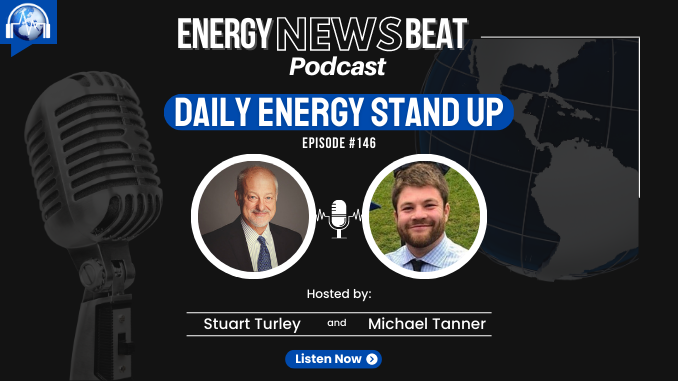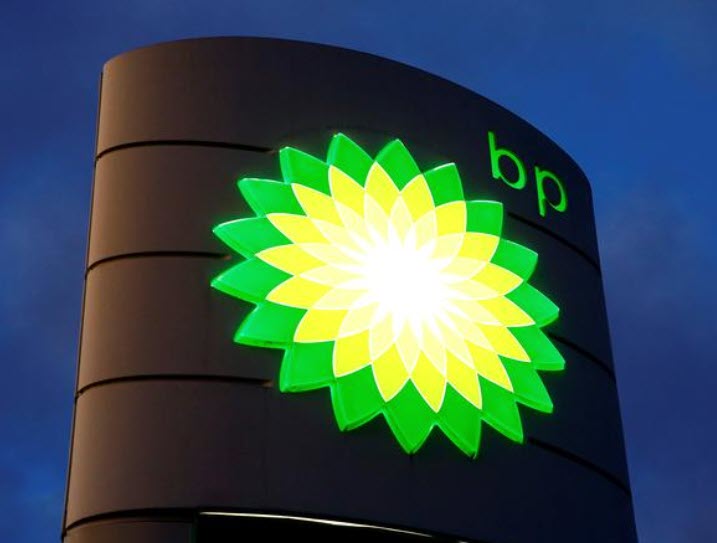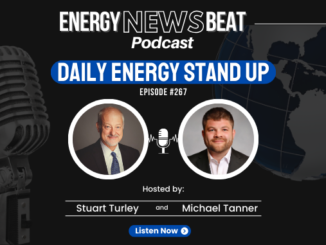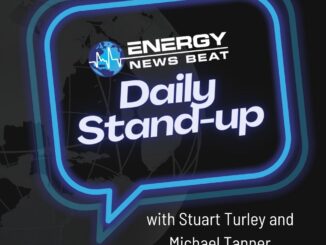
Daily Standup Weekly Top Stories
More Oil, Fewer U.S. Rigs: Hey Saudis, Something to See Here
U.S. drillers have the potential to double oil output from existing wells, thanks to new drilling efficiencies and innovations such as shale well refracturing Higher drilling efficiency is driving U.S. oil production to new highs […]
How World Domination Is Within Tesla’s Grasp
Imagine a firm where all managers and staff are expected to work as entrepreneurs, with: · No budget limits or constraints on spending. · Performance reviews done by the staff, not by bosses. · Practically […]
Texas producers hope debt limit deal puts oil and gas projects on the fast track
WASHINGTON — Congress tucked into the debt limit-raising law a host of provisions to accelerate new energy projects, such as pipelines that could move cheap natural gas from West Texas to energy-thirsty consumers in California […]
Beware this stock market rally because it’s reminiscent of what led up to the 2008 crisis, JPMorgan Asset Management CIO says
The stock market’s ongoing rally is the calm before the storm, according to JPMorgan Asset Management’s CIO. Bob Michele told CNBC that current market conditions remind him of the March-to-June period of 2008. “We’re seeing things that […]
Highlights of the Podcast
00:00 – Intro
00:52 – North Dakota tribe buys Idle Oil Pipeline from Enbridge
05:03 – How world domination is within Tesla’s grasp
10:16 – Texas producers hope debt limit deal puts oil and gas projects on the fast track
13:29 – Beware the stock market rally because it’s reminiscent of what led up to the 2008 crisis
15:31 – Outro
Follow Stuart On LinkedIn and Twitter
Follow Michael On LinkedIn and Twitter
Video Transcription edited for grammar. We disavow any errors unless they make us look better or smarter.
Stuart Turley: [00:00:15] Hey, Everybody, Welcome to The Energy News Beat Daily Stand up June 16th it is Friday. We are so excited that you made it to Friday. Today is a summary of everything that happened in the week and boy, it’s been a crazy week out there. [00:00:32][17.0]
Stuart Turley: [00:00:32] Next week, we’ve even got more stories coming up. I’m interviewing Dr. Patrick Moore, who was the co-founder of Greenpeace Monday night I’m really excited about that so we’ll be having that podcast coming out next week as well, too. So with that have a great weekend and we look forward to hearing from you soon. [00:00:56][23.8]
Stuart Turley: [00:00:57] We’re now in North Dakota tribe buys Idle Oil Pipeline from Enbridge. I absolutely love this story. The Native American tribe in North Dakota bought the energy companies Enbridge to Help not inbred kind of like what your ancestors coming from Arkansas were they had an his that and Arcada nation announced Friday that but did not disclose how much it paid. [00:01:28][30.3]
Stuart Turley: [00:01:28] The tribe expects the pipeline which will connect its oil facilities on its Fort Berthold reservation to Enbridge large pipeline. I am very, very happy for them there needs to be revenue for that tribe and there are more than 2600 active oil and gas wells on the reservation. I’d like to go one step further, Michael. Is there any way that those natural gas dividends or natural gas could go straight to them to deliver low-carbon electricity and stuff? I’d say burn the gas… [00:02:05][36.7]
Michael Tanner: [00:02:05] No, because I don’t think the I don’t think the reservation’s own the minerals. And this is where I think this is why it’s critical that, you know, the last sentence of this article, owning the pipeline will benefit the tribe financially and that’s why this Native American tribe went ahead and bought this. [00:02:19][14.2]
Michael Tanner: [00:02:19] I mean, think about it, there’s 2600 active wells doing 144,000 barrels of oil per day, according to the U.S. Department of Minerals. It’s going to allow them to basically get their hands and get squeezed in to the oil market. And again, there’s there is a probably a lot of bridge financing involved with this. You know what I mean? [00:02:38][18.8]
Michael Tanner: [00:02:39] They didn’t buy this bad boy in cash somebody came in and financed this thing to the cows go. The question is what this is going to most likely allow them to do, is again, unlock 3900 oil and gas wells that companies who own that lease probably want to drill. And now they’re going to be able to take a fee, a barrel fee for transporting this oil. [00:03:01][22.0]
Stuart Turley: [00:03:01] Right. So if they don’t have the minerals, they at least get something from the oil everything pumped out of there. [00:03:06][4.9]
Michael Tanner: [00:03:06] Exactly why buying this pipeline is advantageous, because now you get a a small slice of, you know, whatever, whatever it is. And if you’re talking, you know, 2600 oil and gas wells are doing 145,000 barrels of oil a day. Imagine what 3900 new wells would be good. [00:03:23][16.4]
Stuart Turley: [00:03:24] This particular portion of the pipeline that they bought can transport 15,000 barrels per day. [00:03:29][5.3]
Michael Tanner: [00:03:30] Whoop! Whoop! [00:03:30][0.1]
Stuart Turley: [00:03:31] Hey Rock and Roll! You know, and I always love transporting on a pipeline instead of via a tanker. [00:03:38][7.2]
Michael Tanner: [00:03:39] Oh, Absolutely! You’d much rather this than a train. Holy smokes! You’d rather. But. Great, great. We love this, We love this Crew, Love more people getting their hands on pipelines. I love the the divestiture of pipelines from big entities to smaller entities. [00:03:54][15.4]
Stuart Turley: [00:03:55] Yes. [00:03:55][0.0]
Michael Tanner: [00:03:55] You know, much like what’s going on in Colorado right now with the EMP sector, you’re going to end up seeing 1 to 2 large players that’s what’s happening in been happening in the pipeline space. I love this decoupling from standpoint in Enbridge is notoriously a horrible midstream operator. I’ll just go out there and say that they routinely rank as one of the lower midstream operators for a variety of reasons. We saw that specifically in the Dallas Fed survey that came out a month and a half ago. So love this! [00:04:23][28.4]
Stuart Turley: [00:04:24] Going back and forth between the Canadian border, the I believe it’s the Michigan governor has been really wiping them out and it’s really caused some issues between Canada. So they’re having to deal with a lot of headaches. So, yeah, I’m only in defend them for about two and a half seconds. [00:04:44][19.2]
Michael Tanner: [00:04:44] Talking about scary How world domination is within Tesla’s grasp, I need to hear this one. [00:04:50][5.8]
Stuart Turley: [00:04:51] Okay listen to this one imagine a firm, let me read you these bullet points where all managers and staff are expected to work as entrepreneurs with no budget limits, constraints, or spending performance reviews done by the staff, not the bosses. Practically no managers, no controls from H.R we got to implement that here at Sandstone. [00:05:13][21.9]
Stuart Turley: [00:05:13] No career planning, no managerial ladder to climb welcome to Tesla. I just. I love the way he’s thinking about this. He’s also demanding everybody show back up to the office, What do you think about that, Michael? [00:05:30][16.3]
Michael Tanner: [00:05:31] Well, I mean, I think you have to put the office conversation aside, because I think it’s a nuanced conversation. I think there are things about the in-person experience that is hard to replicate and is impossible to replicate via Zoom. [00:05:45][14.3]
Michael Tanner: [00:05:45] Now, there’s something to be said about hybrid work, in my opinion, doesn’t work because, well, unless it’s done on a consistent company basis that the entire company works on Monday, everybody goes to work, everybody stays home on Tuesday, everybody shows up on Wednesday. [00:05:59][14.1]
Michael Tanner: [00:06:00] This is what my brother has where, you know, it’s you know, he works for Medtronic, which is, you know, a Fortune 50 company. You can Tiber, you work whenever you control the office you cannot show up in the office. And it causes confusion and not confusion but you end up when you go to the office, you end up still engaging in interacting with people in a virtual way. So it lessens the impact of the office when there is nothing more powerful than four people around a whiteboard trying to map out a solution. [00:06:27][26.3]
Stuart Turley: [00:06:28] Oh Absolutely. [00:06:28][0.5]
Michael Tanner: [00:06:28] You cant beat that! You can’t beat that solution. Now, do I think remote work is a positive thing and an attribute should be embraced? Of course, because there’s something I mean, there’s something like when you talk about focus and being able to like get focused quality work done, it can it can be hard in office trust me, I deal with that more than anybody. I got to put a do not I literally have a do not Disturb sign on my office because you’ve got people that don’t care and to walk in they don’t care if your door shut, you know. [00:06:55][27.0]
Michael Tanner: [00:06:56] So getting focused, consistent work can be hard at the office and so that’s why I think in an ultimate case, there’s a balance but I see major pushback from hybrid. So I’d lean one way or the other, he leans in person great. You know, I’m not looking to work at Tesla conveniently. What I think is interesting is no career planning that’s hilarious no controls from H.R. sounds fun to me, honestly, practically no managers. Performance reviews done by staff that’s smart all about that. [00:07:22][26.2]
Stuart Turley: [00:07:22] Very! Intel did that as well. Here’s here’s where it all comes down to it. You also get into the new A.I. and Agile systems in here it all boils down to this. The result of everything that we talked about is the result is a radically different kind of company. [00:07:40][18.0]
Stuart Turley: [00:07:41] Tesla can make up to 60 model changes per day to its vehicles per day, whereas the other auto manufacturers are making model changes every 3 to 5 years. Elon’s brilliant it doesn’t matter what company he’s done. His management and employee processes transcend markets. [00:08:02][21.7]
Michael Tanner: [00:08:03] Yeah, I mean, what he’s doing is he’s is creating a culture in which if you are passionate about electric vehicles, if you are passionate about software, if you are passionate about doing stuff that other people said is impossible, you’re going to love to work here because there’s no barriers, there’s no constraints on how you can work. [00:08:20][17.1]
Michael Tanner: [00:08:21] Now, some people don’t like that some people love the bureaucracy and need the bureaucracy. They need that five layers of management like I had this morning. You know, I had four meetings back to back to back to back and, you know, how much got accomplished at those meetings? ZE–RO! It’s insane, so I’m with them on no meetings. [00:08:41][19.8]
Stuart Turley: [00:08:41] Well, my dad, who was a very executive commander in the military, he had a rule of 15 minutes, unless it was a very, very big meeting and was 30 minutes. And if you couldn’t get you couldn’t get past that sentence, you’re out and he’s onto the next person. There’s a lot you can get done that way. [00:09:00][18.8]
Michael Tanner: [00:09:01] Yeah. I mean, meetings should be reserved or there was an issue you have with somebody and the only thing we need to do is, is hash out the issue that’s what a meeting is for or presenting findings in a way in like a to an audience of more than like three people if you’re meeting is three people at email. [00:09:20][19.0]
Michael Tanner: [00:09:23] There’s some threshold of people where, okay, this qualifies as a meeting. Also, just the fact that most meetings, they’re just they’re pointless. I don’t want to get thrown off because for weeks I’ve been steaming on this. So you’ve touched a nerve with that. [00:09:35][12.0]
Michael Tanner: [00:09:35] I think the best place to start really is, is with this debt deal you know, we saw that get cut. I officially passed yesterday, you know, to kind of rewind a second. The fallout specifically for the oil and gas and energy business was really the regulations surrounding NEPA. NEPA stands for the National Environmental Policy Act. [00:09:54][19.0]
Michael Tanner: [00:09:55] And one of the things that was included in this debt ceiling negotiation from the Republican side of the aisle was, hey, if we’re going to have all of this spending for renewable energy, and this was also a position taken by some of the Democrats, we need to make large scale energy projects permit quicker. [00:10:12][16.8]
Michael Tanner: [00:10:12] And so what happens under these new rules is NEPA is now basically attempting to streamline and make sure that multiple agencies are really all three doing the same job. You know, particularly there are, you know, particularly the agreement to approve the Mountain Valley pipeline in West Virginia to Virginia has gotten the Sierra Club all riled up. [00:10:35][23.4]
Michael Tanner: [00:10:36] I could spend you know, we could spend all the time in the world and I’m not the one to talk about. The political fallout from the debt ceiling still will do that and probably scare us all. What I look at it is large scale energy projects need a level of regulation, but they don’t need the level of regulation that they’ve always had. I think I talked about this in a previous solo show. [00:10:55][18.6]
Michael Tanner: [00:10:55] I mean, the NEPA process is absolutely insane you’re talking about Wells, you know, even talking about mines years in this process, pipelines years in this process, large scale offshore wind, years in this process and I’m down for cutting that time down. [00:11:10][14.7]
Michael Tanner: [00:11:10] Now. I think, you know, they will always find a way to regulate or to regulate through legislation or legislate through regulation. Excuse me, but I think it’s going to be it’s going to be very fascinating about how these new rules are applied I can guarantee you are some consultants. There’s some regulatory consultants running around now in the energy business reading whatever these documents are. [00:11:34][23.8]
Michael Tanner: [00:11:35] You know, again, when your companies like see you in your clubs like Sierra Club and, you know, the Center for Biological Diversity come out and are against it, I mean, that tells you all you need to know about where the rules are taken. This is going to apply not just for large scale energy projects like pipelines, but it’s probably going to help get oil and gas fields developed, no doubt. [00:11:55][20.1]
Michael Tanner: [00:11:55] So I think all in all, if you’re in the oil and gas business where I am, this is going to be helpful. I think if you’re in the midstream business thing, they are why? I think if you’re in the mining and metals business, this is going to be a lengthy even the renewables business it’s going to help you. [00:12:09][14.4]
Michael Tanner: [00:12:10] Again, they want slow regulation it’s clear you read this article I didn’t mention the title of the article. Texas Producers Hope Debt Limit puts oil and gas projects on the fast track. See, that’s how bad I am when I’m doing these solo shows. I need to get to the article title at the end, but I say all that to say the debt deal I think is good for oil and gas it’s good for energy, all types of energy. I’m all about streamlining regulations and then go from there. [00:12:35][25.5]
Stuart Turley: [00:12:36] Beware the stock market rally because it’s reminiscent of what led up to the 2008 crisis. J.P. Morgan Asset Manager Okay, this one is kind of interesting. Stock markets rally this is the first line out of the article, ongoing rally is the calm before the storm according to J.P Morgan’s Asset Management, Bob Michelle told CNBC that current market conditions remind him of the March to June period of 2008. [00:13:05][29.4]
Stuart Turley: [00:13:06] Oh, you see, we’re seeing things you only see in recession or where you wind up in a recession. That to me is kind of frightening on that standpoint is because we don’t know. Has the Fed done a good job to this point? No. Can they get us back around out of this? I don’t think so. And I think the only way that the Fed can get inflation, the Biden administration just released a publication saying that inflation is down but another article came out and said that it is cumulative, not the way that they were misleading the public. And so we’re actually up 13% still in a overall inflation area so let’s all fact check each other take a look at that. [00:13:58][51.9]
Stuart Turley: [00:13:59] Hey, thank you for listening to the weekly wrap up, My name is Stuart Turley and we are so glad for all of our listeners that are out there, all of the interactions that we get. Thank you so much. Like subscribe, leave us only five star reviews and we really look forward to seeing you. Michael and I will be back recording on Sunday, getting ready for the week. Talk to you soon. [00:13:59][0.0]



